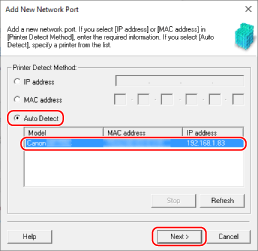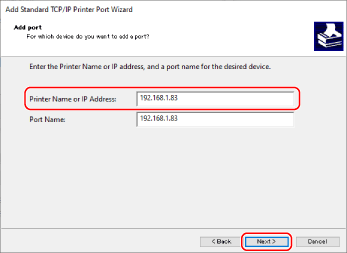Configuring a Printer Port (Windows)
If the IP address of the machine changed or a printer has been added in Windows, you may not be able to print from a computer. In this case, use the printer driver to add a new port.
In addition, you cannot print from a computer when the port type or port number of the printer driver differ from that of the machine setting. In this case, change the setting on the printer driver to match that of the machine.
In addition, you cannot print from a computer when the port type or port number of the printer driver differ from that of the machine setting. In this case, change the setting on the printer driver to match that of the machine.
Adding a Port
The machine supports two types of ports: "MFNP Port" and "Standard TCP/IP Port." Select and add the port to use according to your usage environment.
MFNP Port (only for IPv4 environment)
You can only add this port when a printer driver is installed using the installer. The connection is maintained as long as the machine and computer belong to the same subnet, even if the IP address of the machine is changed.
Standard TCP/IP Port
This is a standard Windows port. You must add a new port every time the IP address of the machine is changed. Select this type of port when you cannot add an MFNP port.
Administrator privileges are required on each computer.
Required Preparations |
Prepare the following information and keep it close by. Checking the Network Status and Settings When adding an MFNP port: the IP address or MAC address of the machine When adding a standard TCP/IP port: the IP address or DNS name (host name) of the machine |
1
Log on to the computer using an administrator account.
2
Click [ ] (Start)
] (Start)  [
[ ] (Settings)
] (Settings)  [Devices]
[Devices]  [Printers & scanners].
[Printers & scanners].
 [
[ [Devices]
[Devices]  [Printers & scanners].
[Printers & scanners].The [Printers & scanners] screen is displayed.
3
Click the printer driver of the machine  [Manage]
[Manage]  [Printer properties].
[Printer properties].
 [Manage]
[Manage]  [Printer properties].
[Printer properties].The printer driver properties screen is displayed.
4
On the [Ports] tab, click [Add Port].
The [Printer Ports] screen is displayed.
5
Add a new port.
 When Adding an MFNP Port
When Adding an MFNP Port
1 | Select [Canon MFNP Port], and click [New Port]. |
2 | Select [Auto Detect] and the machine, and click [Next].  If the machine is not displayed, click [Refresh]. If the machine is still not displayed, select [IP address] or [MAC address], enter the IP address or MAC address of the machine, and then click [Next]. |
3 | Click [Add]. |
 When Adding a Standard TCP/IP Port
When Adding a Standard TCP/IP Port
1 | Select [Standard TCP/IP Port], and click [New Port]. The [Add Standard TCP/IP Printer Port Wizard] screen is displayed. |
2 | Click [Next]. |
3 | Enter the IP address or DNS name (host name), and then click [Next].  The port name is entered automatically, so change it, as needed. When [Additional port information required] Appears Take action following the instructions on the screen. To set [Device Type], select [Canon Network Printing Device with P9100] in [Standard]. |
6
Click [Finish].
A new port is added, and the [Printer Ports] screen is displayed.
7
Click [Close]  [Close].
[Close].
 [Close].
[Close].The settings are applied.
Changing the Port Type and Number
If the machine is configured not to use LPD or RAW, you must change the type of port on the computer to a protocol usable on the machine.
If the LPD or RAW port number was changed, the settings on the computer may have to be changed to match the settings on the machine.
* You do not need to change the port type or number on the computer for WSD ports.
If the LPD or RAW port number was changed, the settings on the computer may have to be changed to match the settings on the machine.
* You do not need to change the port type or number on the computer for WSD ports.
Administrator privileges are required on each computer.
1
Log on to the computer using an administrator account.
2
Click [ ] (Start)
] (Start)  [
[ ] (Settings)
] (Settings)  [Devices]
[Devices]  [Printers & scanners].
[Printers & scanners].
 [
[ [Devices]
[Devices]  [Printers & scanners].
[Printers & scanners].The [Printers & scanners] screen is displayed.
3
Click the printer driver of the machine  [Manage]
[Manage]  [Printer properties].
[Printer properties].
 [Manage]
[Manage]  [Printer properties].
[Printer properties].The printer driver properties screen is displayed.
4
On the [Ports] tab, click [Configure Port].
The [Configure Port] screen or [Configure Standard TCP/IP Port Monitor] screen is displayed.
5
Set the port type and number.
 For an MFNP Port
For an MFNP Port
In [Protocol Type], select [RAW] or [LPR], and change the port number.
 For a Standard TCP/IP Port
For a Standard TCP/IP Port
In [Protocol Type], select [Raw] or [LPR].
When [Raw] is selected, change the port number.
When [LPR] is selected, enter "Ip" for [Queue Name].
6
Click [OK]  [Close].
[Close].
 [Close].
[Close].The settings are applied.